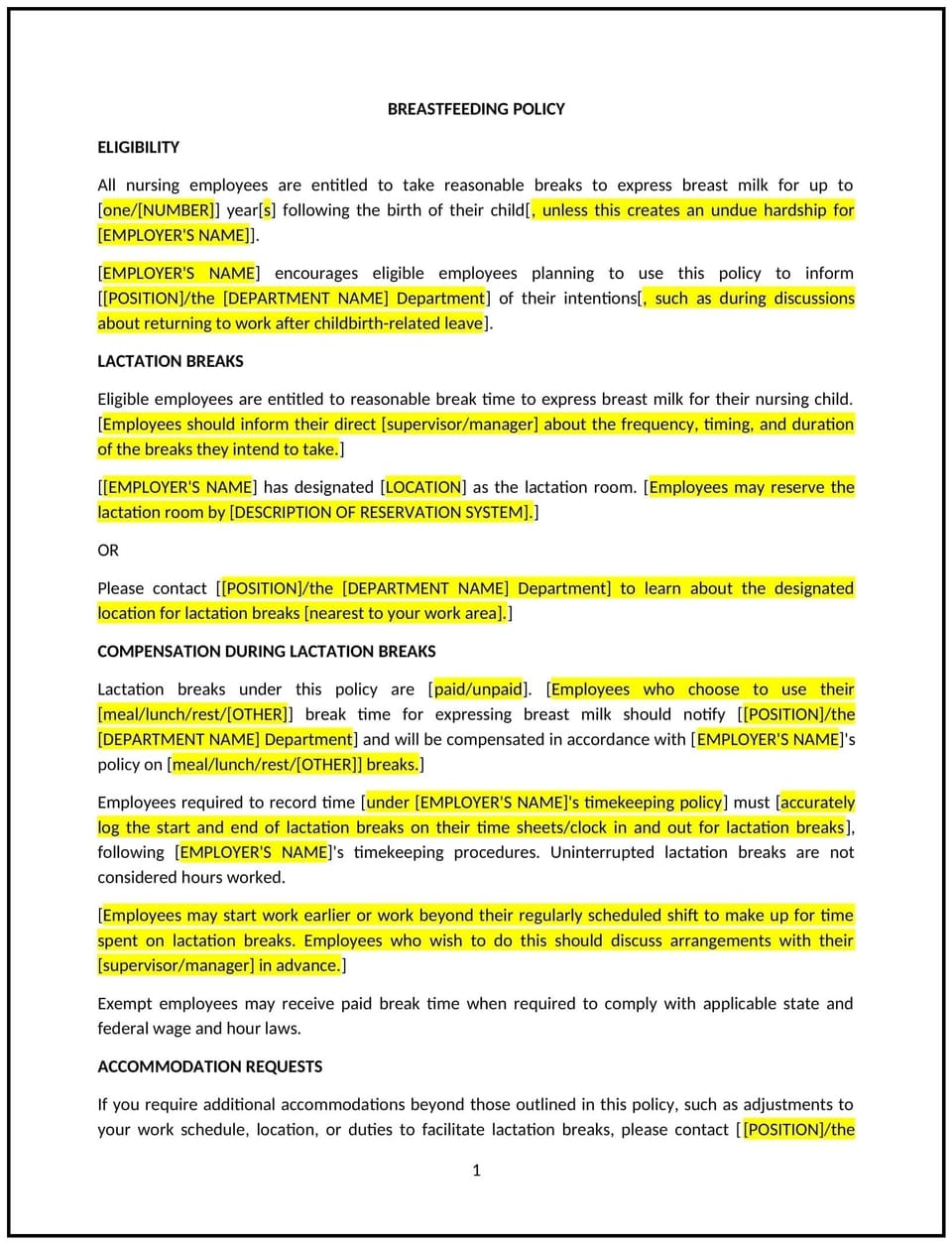Breastfeeding break policy (Connecticut): Free template

Breastfeeding break policy (Connecticut)
A breastfeeding break policy helps Connecticut businesses support new mothers by providing appropriate breaks and spaces for breastfeeding or expressing milk. This policy outlines employees' rights to take breastfeeding breaks, the duration and frequency of breaks, and the accommodations the company will provide to ensure a comfortable and private space for breastfeeding or pumping.
By implementing this policy, businesses can foster an inclusive and supportive environment for new mothers, comply with state and federal laws, and promote employee health and well-being.
How to use this breastfeeding break policy (Connecticut)
- Define employee rights: Clearly state that employees have the right to take reasonable breaks to breastfeed or express milk during work hours, as required by Connecticut and federal laws.
- Set break duration and frequency: Specify the length and frequency of breastfeeding breaks, ensuring they are reasonable and appropriate for the employee’s needs.
- Provide a private space: Outline how the company will provide a private, clean, and comfortable space for employees to breastfeed or pump, which is not a restroom.
- Address flexibility: Encourage flexibility in break times to accommodate the employee’s breastfeeding schedule, and discuss options for adjusting work schedules if needed.
- Support compliance: Ensure the policy aligns with Connecticut laws regarding breastfeeding breaks and the Fair Labor Standards Act (FLSA), which requires employers to provide time and space for lactating employees.
Benefits of using this breastfeeding break policy (Connecticut)
This policy offers several benefits for Connecticut businesses:
- Promotes employee health: Supports new mothers in maintaining their health and the health of their child by providing adequate breastfeeding or pumping breaks.
- Supports compliance: Aligns with Connecticut laws and federal regulations, reducing the risk of legal issues or complaints.
- Enhances employee morale: Demonstrates the company’s commitment to supporting employees’ needs and creating a family-friendly work environment.
- Improves retention: Fosters employee loyalty and retention by accommodating the needs of working mothers, allowing them to balance work and family responsibilities.
- Strengthens company reputation: Positions the company as a supportive and inclusive employer, enhancing its reputation and attracting top talent.
Tips for using this breastfeeding break policy (Connecticut)
- Communicate the policy clearly: Ensure employees are informed about their rights to breastfeeding breaks and the facilities available to them.
- Offer privacy and comfort: Provide a designated space that is private, clean, and comfortable for breastfeeding or pumping, and ensure it is easily accessible.
- Be flexible: Recognize that breastfeeding needs may vary, and provide flexibility in scheduling breaks as needed.
- Train managers: Ensure that supervisors understand the policy and are trained to support employees in taking breastfeeding breaks without stigma or discrimination.
- Review periodically: Update the policy as needed to reflect changes in Connecticut laws, federal regulations, or employee needs.
Q: How does this policy benefit my business?
A: The policy helps comply with Connecticut and federal laws, supports employee well-being, and fosters a positive, inclusive work environment for new mothers.
Q: How often can employees take breastfeeding breaks?
A: Employees are entitled to reasonable breaks, which typically occur every few hours, but the frequency and duration should be based on individual needs and discussed with the employee.
Q: Do businesses have to provide a dedicated room for breastfeeding?
A: Yes, businesses must provide a private, clean space for breastfeeding or expressing milk, which is not a restroom. This ensures comfort and privacy for the employee.
Q: Are breastfeeding breaks paid?
A: Breaks are typically unpaid, but businesses may choose to pay employees for the time spent breastfeeding or expressing milk during breaks, depending on their company policies.
Q: How often should this policy be reviewed?
A: The policy should be reviewed annually or whenever there are changes to Connecticut laws, federal regulations, or company needs to ensure it remains effective and compliant.
This article contains general legal information and does not contain legal advice. Cobrief is not a law firm or a substitute for an attorney or law firm. The law is complex and changes often. For legal advice, please ask a lawyer.


